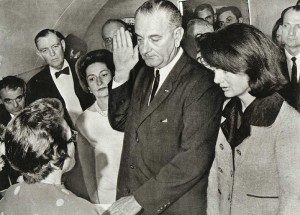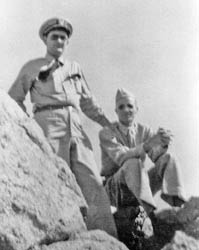“Raider” Johnson, President and war hero?

Did you know that Lyndon B. Johnson, the 36th President of the United States, was a recipient of the Silver Star?
“The most you can say about Lyndon Johnson and his Silver Star, is that surely one of the most undeserved Silver Stars in history because if you accept everything that he said, he would still in action for no more than 13 minutes and only as an observer,” said JBJ’s biographer Robert Caro in an interview on CNN. “Men who flew many missions, brave men, never got a Silver Star.”
Johnson was serving as a U.S. Congressman for Texas’ 10th district when war broke out. Three days after the attack on Pearl Harbor, Johnson accepted a commission in the Naval Reserve at the rank of lieutenant commander. If LBJ’s medal is fraudulent — and by all credible accounts it appears to be — this is a disgrace to the men who legitimately earned the Silver Star, and those who are deserving of the medal, but were not awarded. By comparison, Pres. John F. Kennedy’s famous actions during World War II only earned him the Navy and Marine Corps Medal.

Johnson’s citation reads:
“For gallantry in action in the vicinity of Port Moresby and Salamaua, New Guinea on June 9, 1942. While on a mission of obtaining information in the Southwest Pacific area, Lieutenant Commander Johnson, in order to obtain personal knowledge of combat conditions, volunteered as an observer on a hazardous aerial combat mission over hostile positions in New Guinea. As our planes neared the target area they were intercepted by eight hostile fighters. When, at this time, the plane in which Lieutenant Commander Johnson was an observer, developed mechanical trouble and was forced to turn back alone, presenting a favorable target to the enemy fighters, he evidenced marked coolness in spite of the hazards involved. His gallant action enabled him to obtain and return with valuable information.”
Johnson was merely an observer on the flight, and no one else on the plane was awarded a medal.
“I would say it’s a tissue of exaggerations,” added Caro. “He said that he flew on many missions, not one mission. He said that the crewmen — the other members of the Air Force group, were so admiring of him they called him ‘Raider’ Johnson — neither of these things are true.”